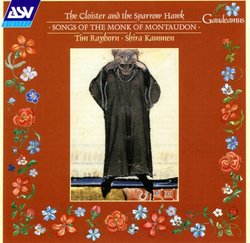| All Artists: Shira Kammen, Tim Rayborn, Alison Sabedoria Title: The Cloister and the Sparrow Hawk: Songs of the Monk of Montaudon (Twelfth Century) - Tim Rayborn & Shira Kammen Members Wishing: 0 Total Copies: 0 Label: Gaudeamus Release Date: 8/18/1998 Genres: Dance & Electronic, Pop, Classical Styles: Vocal Pop, Opera & Classical Vocal, Chamber Music, Historical Periods, Early Music Number of Discs: 1 SwapaCD Credits: 1 UPC: 743625017526 |
Search - Shira Kammen, Tim Rayborn, Alison Sabedoria :: The Cloister and the Sparrow Hawk: Songs of the Monk of Montaudon (Twelfth Century) - Tim Rayborn & Shira Kammen
CD Details |
CD ReviewsVery highly recommended! Leslie Richford | Selsingen, Lower Saxony | 11/03/2008 (5 out of 5 stars) "The Cloister and the Sparrow Hawk. Songs of the Monk of Montaudon [12th century]. Tim Rayborn (vocals, harp, 'ud, percussion); Shira Kammen (fiddle, rebec, harp); Alison Sabedoria (vocals, bell). Studio recording made between 19th and 21st August 1997. First published in 1998 as ASV Gaudeamus GAU 175. Total playing time: 59'58".
What a pity that, thanks to the inundation of early music recordings over the last few years, I only recently discovered this exciting disc. Tim Rayborn, a specialist for medieval and Middle Eastern music and founder of the Florata Ensemble, here got together with Shira Kammen, well-known for her part in recordings by Alcatraz and P.A.N., to record songs by one of the most fascinating figures from the era of the "troubadours". Not at all easy! The monk of Montaudon did not reveal even his real name, let alone the dates of his life. And in most cases, with the exception of just one or two, his songs have only survived in a text version without a melody. However, Rayborn and Kammen were equal to the task: they put these songs to melodies known to have been used by other troubadours of the period. And between the songs they play, on their genuinely medieval instruments, compositions of their own which are based on motives from the Monk's songs. The texts are written in Occitanian, a language which was widely spoken in the South of France at the time and which has similarities to Catalan. Tim Rayborn has really got to grips with these unusual, often humorous texts and sings them with inflection and urgency as though he had written them himself only yesterday, sometimes adding certain noises to illustrate the texts when they talk about, say, bad food or, umm, let's say, certain other human necessities. On "Quan tuit aquist clam foron fat" he shares the vocals with Alison Sabedoria, who provides very fitting half-sung, half-spoken vocals: this really amusing song is about a legal contest between saints' icons and women about the paint that women think they have to use as make-up. Delightful stuff! As far as the text is concerned - the booklet contains the Occitanian text with a very good, scientifically-based English translation - there is plenty here to amuse and also to shock: there is only one traditional troubadour-style love song on the disc, the other texts could be described as satire or mockery, the good monk poking fun at the bad habits of his contemporaries and, in the last number, which lasts all of 13 minutes, at twelve other troubadours, before finally turning his venom on himself. Care is needed with the text of "Be m'enuela, so auzes dire?", which is as obscene as anything I have ever heard from the Middle Ages and really crosses the border of what is acceptable taste-wise. But it would be petty to complain when there is such a wonderful interpretation to be heard! The engineering, too, is excellent. The disc was made in a studio, where Tim Rayborn's singing was given a bit of extra echo, but in the end everything comes over very loud and clear, this is almost like a top-quality pop or jazz recording. Very highly recommended to lovers of medieval vocal and instrumental art!" |


 Track Listings (11) - Disc #1
Track Listings (11) - Disc #1